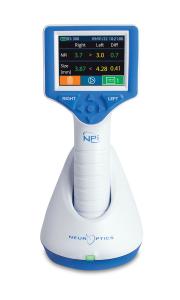Germany - Amsterdam Aesthetics originally published at Germany - Amsterdam Aesthetics

Study shows the NPi® differential is another value measured by the NPi Pupillometer that clinicians should consider when managing critically ill patients
IRVINE, CALIF., UNITED STATES, September 14, 2022 /EINPresswire.com/ — A new peer-reviewed study shows that even one occurrence of an abnormal Neurological Pupil index (NPi®) differential, measured by NeurOptics’ NPi Pupillometer, can be an early indicator of neurological injury. Automated pupillometry has emerged as an important technology that provides a quantitative measurement of pupil size and reactivity, expressed as the Neurological Pupil index (NPi). NPi values range from 0 to 4.9, with scores under 3 considered abnormal. The presence of an abnormal NPi differential (a difference ≥ 0.7 between the right and left eye NPi values) is an important factor clinicians should consider in decision making when managing critically ill patients with brain injury and those at risk of secondary neurological injury.
(NPi®) differential, measured by NeurOptics’ NPi Pupillometer, can be an early indicator of neurological injury. Automated pupillometry has emerged as an important technology that provides a quantitative measurement of pupil size and reactivity, expressed as the Neurological Pupil index (NPi). NPi values range from 0 to 4.9, with scores under 3 considered abnormal. The presence of an abnormal NPi differential (a difference ≥ 0.7 between the right and left eye NPi values) is an important factor clinicians should consider in decision making when managing critically ill patients with brain injury and those at risk of secondary neurological injury.
The study, published in BMC Neurology, reviewed more than 54,000 NPi scores from 1,285 patients who suffered from stroke (1,200 patients) or traumatic brain injury (185 patients) at four U.S. hospitals and one hospital in Japan. Patients were assessed using NeurOptics’ automated pupillometer to objectively measure pupil size and reactivity, NPi, in each eye and calculate the NPi differential. Results showed that both stroke and TBI patients with no occurrences of an abnormal NPi differential (equal or greater than 0.7) were associated with better outcomes at discharge (lower discharge modified Rankin Scale scores) than patients with at least one occurrence of an abnormal NPi differential. The NPi differential may be detected before NPi values of the individual (right and left) eyes become abnormal, providing an earlier indicator of neurological deficit.
“The brain is particularly sensitive to change and caring for critically ill patients requires that we identify and respond to neurological changes as early as possible,” said DaiWai M. Olson, PhD, RN, FNCS, Professor of Neurology and Neurosurgery and Director of the Neuroscience Nursing Research Center at the University of Texas Southwestern Medical Center. “This study confirms that automated pupillometry and the NPi score can accurately detect differences in pupil function – and these differences are early signals that we need to expedite and elevate patient care. This publication adds to the growing body of knowledge demonstrating the role of automated pupillometry for improving care and improving patient outcomes.”
While there are over 100 peer-reviewed publications and scientific abstracts supporting the value of NPi pupillometry and bilateral NPi measurements in enhancing clinical decision making and patient care, this is one of the first peer-reviewed studies to investigate the value of the NPi differential. This publication follows another study published last year in Neurological and Neurosurgical Nursing, which demonstrated that the NPi differential reflects a trend where neurologic deficit is impacting one eye earlier (or more significantly) than the other eye—a key to early detection of declining status.
NeurOptics’ quantitative automated pupillometer provides a reliable measurement of pupil size and reactivity and tracks changes over time, allowing for earlier intervention for patients with brain injury and those at risk of secondary neurological injury. The NPi Pupillometer supports neurological examination in adult and pediatric patients across a broad spectrum of diagnoses, including traumatic brain injury, stroke, seizure, or other neurological events after cardiac arrest and other medical conditions.
About NeurOptics
Headquartered in Irvine, Calif., NeurOptics is the leader in the science of pupillometry. Driven by a passion to help clinicians improve patient outcomes, NeurOptics develops and markets innovative technology for use in critical care medicine, neurology, neurosurgery, emergency medicine, and research. The NeurOptics’ NPi Pupillometer has been included in more than 100 clinical studies, adopted in over 580 hospitals in the U.S., and is represented in more than 30 countries worldwide. For more information, visit www.NeurOptics.com. Follow NeurOptics on Facebook, LinkedIn, and Twitter.
###
Domminique Depianti
NeurOptics, Inc.
+1 949-250-9792
[email protected]
Visit us on social media:
Facebook
Twitter
LinkedIn
![]()
The post New Study Uses NeurOptics’ Pupillometer to Measure the NPi® Differential, an Earlier Indicator of Neurological Injury first appeared on Amsterdam Aesthetics.
Germany - Amsterdam Aesthetics originally published at Germany - Amsterdam Aesthetics

